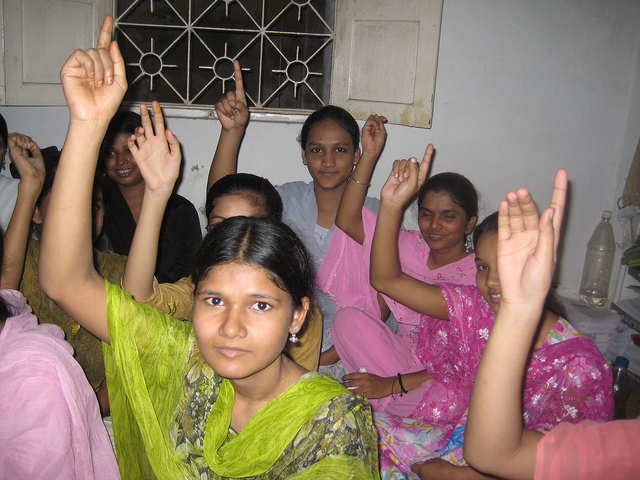Jointly sponsored by UNDP and OECD, the High-Level Meeting intended to demonstrate progress towards truly global partnerships between governments, business and civil society in making development co-operation more effective and sustainable. But opening remarks by leaders of the two sponsoring agencies and the plenary panel discussion seemed largely focused on ‘aid effectiveness’. Concepts of risk management, improving public finance management and procurement systems of recipient countries, predictability of aid flows and monitoring results to report to donor countries’ parliaments were the main discussion points. Progress on these aspects seemed to be the dominant concern of sponsors and panellists.
In break-out groups, aid continued to be the focus around which issues of ownership, transparency and partnerships were being constructed and realised.
As a delegate from India –now a large middle-income country (MIC) with high levels of poverty, despite its rapid economic growth during the past decade– these conversations seemed to me somewhat irrelevant and dated. Instead, critical issues of malnutrition, violence against women, social inclusion and sustainable livelihoods need to be tackled in India through improved democratic governance, transparency and accountability. Domestic resources are adequate for addressing these issues in my country, but they are not deployed in an efficient and productive manner.
This significant gathering in Mexico of over 1,500 delegates from around the world raised important questions for the future of development co-operation. Is a new global partnership being constructed around the old issues of ODA? Are lingering concerns of aid effectiveness from Paris and Accra still unresolved 30 months after Busan? Will a new age of development co-operation be able to break free from previous ODA (Official Development Aid) frameworks? Will new actors in the development arena — large emerging economies such as the BRICS (Brazil, Russia, India, China and South Africa) and other middle income countries– find resonance of their principles and aspirations in future debates? How will local level ground-up partnerships define contextually appropriate development effectiveness, without reference to global actors?
Various focus sessions and plenary presentations during the two-day conference demonstrated several shifting trends. First, emphasis on effective development co-operation was reiterated as an important shift away from Busan. But it was not clear how the effective co-operation framework and indicators would differ from the old ‘aid effectiveness’ paradigm in practice.
Second, inclusive multi-stakeholder partnerships involving governments, civil society, business and thinktanks were agreed to be crucial to achieveing effective development co-operation. What remains ambiguous is how unequal power relations between stakeholders can be handled for meaningful co-operation.
Third, speakers acknowledged the distinctive and unique nature of South-South co-operation, while also aspiring for triangular North-South-South co-operation approaches.
Finally, there was welcome attention to the strengths and development challenges of the MICs. As the president of Mexico reminded the audience, countries like his are both recipients and providers of development assistance and hence able to better empathise with other developing countries.
Non-state actors are becoming more relevant in promoting development effectiveness and civil society organisations from many larger MICs have long worked in solidarity with their counterparts in other developing countries. Now, businesses and thinktanks are also becoming important non-state actors in promoting South-South development co-operation.
The Rising Powers in International Development Programme, hosted by the UK Institute of Development Studies (IDS), is working to build an evidence base around the role of rising powers in international development, producing new thinking and practical guidance on engagement and mutual learning.
The programme’s global delegation attended the Mexico meeting to share lessons from non-state actors’ contributions in the emerging Global Partnership for Effective Development Cooperation and we will continue to strengthen civil society contributions through the new Future International Co-operation Policy Network.
Beyond demanding transparency and accountability around the aid that their own countries still receive, we’ve found that civil society organisations from MICs can add significant value to other countries’ development cooperation. From the four case studies we presented at the High-Level Meeting, we derived four important lessons for taking forward principles and mechanisms of civil society-led South-South Development Cooperation (SSDC).
Firstly, solidarity and trust between cooperation partners can lead to more focused civil society-led South-South cooperation and mobilise broader coalitions for common causes.
Secondly, because civil society-led South South cooperation aspires to be more flexible and adaptable than traditional North-South donor realtionships, it avoids intrusive conditions and creates space for innovation.
Thirdly, a multi-stakeholder approach is essential to ensuring sustainability.
Finally, new methods of measuring SSDC need to be explored to capture the complex effects of civil society-led transnational initiatives.
Alongside governments and businesses, CSOs have been developing innovative practices to contribute to the global struggle against poverty. They have considerable experience and great potential of sharing these practices internationally as well as at home, and their important contributions should not get lost in the state-to-state negotiations that can often become the focus of global initiatives such as the Global Partnership.
—-
Rajesh Tandon is the Founder and President of Indian civil society organisation Participatory Research in Asia (PRIA) and a member of the Future International Cooperation Policy Network.
]]>
As I reported last month, [...]]]>
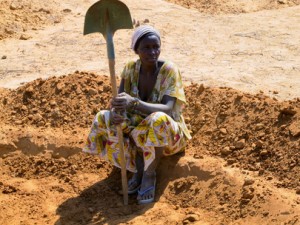
UN Photo/WFP/Phil Behan
As Beyonce’s video celebrating World Humanitarian Day continues to make its rounds through the internet, humanitarian workers on the ground in the drought-affected Sahel arguably have bigger fish to fry as they try to stave off deteriorating conditions in Niger and Mali amidst staggering shortages in relief funding.
As I reported last month, the United Nations Office for the Coordination of Humanitarian Affairs (OCHA) recently adjusted its needs projections for 2012 upward in light of what can be called a foreseeable escalation of the food crisis in the Sahel that started last fall.
Now it looks like cholera and locusts are further foiling already underfunded relief efforts across West Africa.
With four months left to the year, only 51 percent of the funding goal for the region has been met according to latest numbers by the U.N.’s Financial Tracking Service.
So far, an estimated 19 million people in the region are in dire need of assistance, many of whom were expected to rely on emergency food aid as primary means of sustenance by August.
In a special humanitarian bulletin on the Sahel crisis published last week, OCHA now warns of a developing locust infestation that could affect another 50 million people and diminish yields in the upcoming October harvest.
“Desert locust infestation remains dangerous as more egg-laying and hatching are expected in the coming weeks. Agricultural crop production, food and nutrition security, and the livelihood of some 50 million people in Chad, Mali and Niger are currently at risk, according to the FAO. This threat is the most serious since 2005.
Ground teams in Niger have treated 1,200 hectares against the pest since 5 June but ground surveys need to be scaled up to determine the scale and extent of current breeding, especially in those areas where rains have recently fallen.”
Still, rains are badly needed, as an early end to the current rainy season would further affect the upcoming harvest and increase food prices, according to a special report by the Famine Early Warning System Network.
As if that weren’t enough to juggle, cholera is now becoming an increasing worry in Niger, where refugee camps are a potential hotbed for the disease that could affect neighbouring countries along the Niger river, such as Mali, Nigeria and Benin.
About 52.000 people have fled political upheaval in Mali for Niger where 394,000 children under five will need treatment for severe acute malnutrition this year, according to UNICEF, which warns that malnutrition increases the chances of cholera outbreaks.
Nigeria has seen three times the number of cholera cases this year that it registered in 2011, according to Innocent Nzeyimana, the World Health Organization (WHO) Emergencies Manager in Niger in a recent OCHA story. “At this rate, we should be prepared for at least 9,000 cases by December.”
More from Nzeyimana:
“With high levels of water contamination and inadequate sanitation, our area is so prone to cholera. We’ve had cases in 2010 and 2011, but this time it is really getting serious.”
“In a closed environment like a camp, the spread is very fast and we may end up dealing far beyond the 9,000 projected cases. We don’t want that to happen.”
Prevention and treatment of cholera, meanwhile remains underfunded across the Sahel, with only 21 percent of the projected 53 million dollars needed for such programmes covered so far. In Niger only 30 percent of the roughly 8-million-dollar projected sanitation need has been met.
Organizations increasing their appeals
Last week, U.K.-based NGO Christian Aid doubled down on its aid appeal amidst reports by the World Food Programme (WFP) that without increased international support an estimated quarter million people fleeing political instability in Mali for neighbouring Niger, Mauritania and Burkina Faso, will go hungry in just weeks.
WFP is appealing for urgent contributions of 115 million dollars to address pipeline shortfalls for the next three months, according to last week’s OCHA bulletin, as the region is going through its lean season.
As the region awaits the fall harvest and food prices soar, many families continue to sell off their life stock, thus further diminishing their future capacity to foresee in their own livelihoods.
The United Nations Food and Agricultural Organization (FAO), which aims to build farmer’s resilience to future crises has seen less than 25 percent of its 112-million-dollar appeal met, threatening FAO’s ability to support preparations for the next food production campaign from October to December.
FAO is appealing for 10 million dollars to tackle the locust situation. So far France has contributed 550,000 dollars, and another 2.8 million has been pledged bi-laterally.
Last month, British NGO Development Initiatives released a comprehensive report on Humanitarian Aid that projected record shortfalls for 2012. Among other conclusions, the report showed a disproportionate funding for the 2010 mega-disasters in Haiti and Pakistan that syphoned away funds from other countries, including crisis prevention in countries in the now heavily affected Sahel region.
A quote from an OCHA rep in a recent AP article sums it up nicely, I think:
“Pictures of starving goats do not attract aid in the same way as images of dying children.”
Well, folks, we’re getting there.
]]>
At the coffee plantation Monte Café, to the left of its dilapidated pink colonial buildings, stands a huge shed. The caretaker unlocks a gigantic padlock and we step into a surreal [...]]]>

Ghost factory. By M. Sayagues
At the coffee plantation Monte Café, to the left of its dilapidated pink colonial buildings, stands a huge shed. The caretaker unlocks a gigantic padlock and we step into a surreal décor for a tropical Blade Runner movie.
The shed houses a web of pipes and drums, coffee-processing machinery made by the Brazilian company Pinhalense. It is huge, complex – and never used.
The caretaker remembers when the machines were put in place, about a decade ago, but he never saw them working.
Donors pulled the plug on this US$24 million project after US$14 were spent and a few siphoned off.
The project was sponsored by ESAGRI, the agricultural arm of the Portuguese group Espirito Santo, with US$10.9 from the African Development Bank, totalling US$13 in foreign aid.
I went with a coffee grower who groaned at all the inappropriate elements: for example, a wasteful layout and excessive drying capacity for the production of the 1,800-hectares plantation. The optical scanner for bean selection made him laugh: it required a dust-free, air-conditioned environment, not the dust, humidity and power cuts of Sao Tome.
Going back to the capital after 4 pm, there were no taxis so I start walking. A man in a 4×4 offers me a ride. He is a businessman in his fifties and he insists on showing me his failed textile factory.
In the 1980s, it produced trousers and shirts for both the local market and for Angola, following an agreement between the two allied Marxist governments. When Angola liberalized its economy in the late 1990s, the contract was cancelled and the factory closed.
“Naively, we thought the contract would go on forever and did not look for other markets,” he explained.
Another padlock, another eerily silent space, a 2,000 sq.metres building with rows of old sewing machines.
Two ghost factories: one, the failure of a donor-funded development project. The other, a failure of the post-colonial regime’s industrialisation drive.
Provocative analysis

Improductive from Day One. By M. Sayagues
Africa is littered with abandoned industrial parks and two new, thought-provoking books explain why.
In Dead Aid, Zambian economist Dambisa Moyo argues that foreign aid to Africa has discouraged free enterprise while fuelling corruption and rent-seeking, defined as the use of governmental authority to make and take money without trade or production of wealth.
Aid, she says, lowers the incentive for investment and chokes off growth.
Because aid flows are seen as permanent income, policymakers have no incentive to look for other ways of financing development. Worse, they have no sense of urgency “in remedying Africa’s critical woes.”
In Architects of Poverty, South African author Moeletsi Mbeki argues that African elites obstruct the development of an indigenous entrepreneurial class, seen as a threat to their power. (Read an interview here).
Instead, elites entrench themselves as a “parasitic bureaucratic bourgeoisie…unproductive but wealthy black crony capitalists” who live off state revenues, ignore or exploit peasants, and divert profits to elite consumption or capital flight.
Mbeki notes that one of the biggest scandals is the underinvestment in transport in Africa.
Long wait
The 70 kms drive from Sao Tome to Porto Alegre on the south of the island takes 5 hours and a sturdy car to negotiate potholes.
Few minibuses ply this route because drivers don’t want to destroy their cars. So the trip from Porto Alegre to the capital turns into a day-long journey. That hurts tourism, trade and travel.
Since 7 am, Alice Tavares waited for a bus with her 2 young children and a neighbour’s teenager. They carried school satchels, two baskets of fish, five bundles of clothes and two jerry cans of petrol.
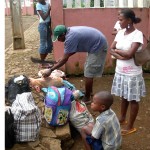
Patient Alice buys a pig. M. Sayagues
The early minibus was full. The second arrived at noon and went half-way to Angolares, where we waited for three hours. Alice bought a freshly butchered pig and stuffed it in a plastic bag. I took photos. We got to the capital after sunset.
How hard can it be to maintain a total of 320 kms of roads in the tiny islands? Since 2007, small billboards brag about a European Union aid project to improve roads. What a joke. Looks more like dead aid managed by the architects of poverty.
]]>Instead of striking a balance between ambition and realism, the MDGs have become [...]]]>
Instead of striking a balance between ambition and realism, the MDGs have become “money-metric and donor-centric”, “meaningless catch-all phrases.”
So says Jan Vandemoortele, a Belgian national, a United Nations senior official and one of the architects of the MDGs, in a thought-provoking article in the July issue of Development Policy Review of the Overseas Development Institute. (read it here)
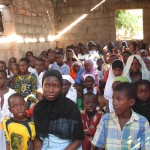
Unrealistic goal? A crowded classroom in Guinea Bissau...
The author recalls that the MDGs were set up in 2000 as collective targets based on extrapolations of global trends. They are vague by definition; they are not one-size-fits-all.
Instead, one should look at countries’ historical backgrounds, natural endowments and specific problems, then adapt the Goals to each circumstance, as Mozambique, Cambodia and Ethiopia have done.
Otherwise, this puts undue pressure on the poorest countries and, given that most of these are in Africa, nurtures Afro-pessimism.
For example, the global target for education “is not realistic” for countries in conflict, he says.
True, targets do change. For example, water for all in 2015 morphed into the more feasible goal of halving the number of people without clean water.
Magic numbers
A mantra has evolved: if only there were more money and higher economic growth, the MDGs would be achieved. Who is fond of these “magic numbers”? Staff at global headquarters of aid organisations, says the author, because of their “excessive reliance on abstract concepts.” (he should know, with his long career as a top UN official).
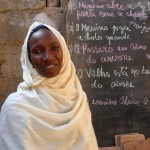
..and their teacher. By M. Sayagues
Vandemoortele sees the MDG canon being usurped by interest groups to push their agendas or devalued “as a repackaged call for more foreign aid.”
Rather, the MDG should be a tool to examine disparities and inequities within countries. In his view, the poorest people continue to be excluded. Many of these are women. Without better sex-disaggregated data, the gender dimension of hunger, illiteracy, disease and poverty remains unexposed.
Most progress takes place among the better off, and inequality and inequity keep rising, says the author.
“The targets are often presented as a universal good that will not demand tough policy choices and hard trade-offs among social groups within a country,” he says.
The MDGs should usher in new thinking about inequalities if they are not to miss the point
What do you think? Send us your views.
]]>